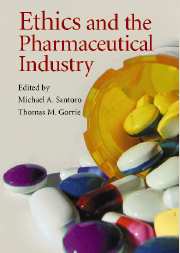Book contents
- Frontmatter
- Contents
- Tables
- Figures
- About the Editors
- Contributors
- Preface
- Acknowledgments
- Foreword
- Introduction: Charting a Sustainable Path for the Twenty-First Century Pharmaceutical Industry
- PART I PROFITS, PATIENTS' RIGHTS, AND SCIENTIFIC PROGRESS: THE ETHICS OF CLINICAL RESEARCH CONDUCTED IN PRIVATE ENTERPRISES
- PART II MARKETING AND THE EFFICIENT UTILIZATION OF HEALTHCARE RESOURCES: ETHICAL AND PUBLIC POLICY CHALLENGES
- PART III PATENTS, PRICING, AND EQUAL ACCESS
- PART IV CONCLUDING THOUGHTS: CHARTING A SUSTAINABLE PATH FOR THE TWENTY-FIRST CENTURY
- Notes
- Index
Introduction: Charting a Sustainable Path for the Twenty-First Century Pharmaceutical Industry
Published online by Cambridge University Press: 04 December 2009
- Frontmatter
- Contents
- Tables
- Figures
- About the Editors
- Contributors
- Preface
- Acknowledgments
- Foreword
- Introduction: Charting a Sustainable Path for the Twenty-First Century Pharmaceutical Industry
- PART I PROFITS, PATIENTS' RIGHTS, AND SCIENTIFIC PROGRESS: THE ETHICS OF CLINICAL RESEARCH CONDUCTED IN PRIVATE ENTERPRISES
- PART II MARKETING AND THE EFFICIENT UTILIZATION OF HEALTHCARE RESOURCES: ETHICAL AND PUBLIC POLICY CHALLENGES
- PART III PATENTS, PRICING, AND EQUAL ACCESS
- PART IV CONCLUDING THOUGHTS: CHARTING A SUSTAINABLE PATH FOR THE TWENTY-FIRST CENTURY
- Notes
- Index
Summary
This industry delivered miracles, and now they're throwing it all away. They just don't get it.
Dr. Roy Vagelos, former Chairman, Merck & Co.The unraveling of the “grand bargain”
Perhaps no business engages the worlds of science, medicine, economics, health, human rights, government, and social welfare as much as the pharmaceutical industry. As the twenty-first century begins, however, there is growing controversy and even hostility in the relationship between the pharmaceutical industry and the public. The millions of individuals, families, and communities throughout the world that have been stricken by the scourge of AIDS offer the most tragic human face to this controversy, but it is no overstatement to say that the pharmaceutical industry impacts the life of virtually every person in the world.
What we are witnessing is the unraveling of a “grand bargain” between the pharmaceutical industry and society. This grand bargain was a complex, implicit social contract that allowed the modern global pharmaceutical industry to emerge in the second half of the twentieth century. Although the industry prospered immensely, society also enjoyed a bountiful array of life-saving and life-enhancing drugs. As the twenty-first century begins, however, this grand bargain is in tatters and public mistrust and resentment of the industry run feverishly high. Many feel that the enormous industry profits are not sufficiently matched by contributions to the common good. What factors are behind this growing tension between the pharmaceutical industry and society?
- Type
- Chapter
- Information
- Ethics and the Pharmaceutical Industry , pp. 1 - 6Publisher: Cambridge University PressPrint publication year: 2005
- 5
- Cited by

